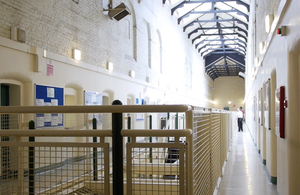Government backs record numbers of female offenders into work
More female offenders than ever recorded before are in work 6 months after their release from prison as a direct result of government action – cutting crime and keeping the public safe.

- female offenders steered away from crime thanks to targeted support
- over £14 million invested to address root causes of female offending
- part of government strategy to reduce number of women committing crime
More than £14 million has been invested into women’s services in the community as part of the government’s Female Offender Strategy and Delivery Plan, helping female offenders get clean, move away from abusive relationships, and find work and stable accommodation.
One year on since its launch, hundreds of female offenders have been supported into employment after their release from prison – up four per cent on the previous year.
Specialist services have also provided female offenders with tailored mental health or drug treatment support. The number of female offenders being sent to prison has reduced by over a quarter since 2010.
This support is key to cutting crime as around one-third of female offenders have a history of drug abuse and more than three-fifths of women have experienced domestic abuse.
Prisons and Probation Minister, Edward Argar, said:
We know many female offenders have suffered trauma in their lives or are battling addiction issues and it’s key that we tackle those underlying factors to help stop their offending and to make positive choices about their futures.
Our approach is clearly working as the number of women serving short sentences is falling and more women are now in work, giving them the best chance to truly turn their backs on crime and keep the public safe.
Tackling the root causes of female offending and providing women with the specialist support they need is a key part of the delivery plan, which aims to steer women away from prison. The Government has completed over a third of the commitments since it was published last year.
This is alongside the launch of a new Intensive Supervision Court for women at Birmingham Magistrates’ Court which uses a problem-solving approach to divert low-level female offenders away from short prison sentences.
The women sentenced through the court will have one-to-one meetings with judges to track their progress as well as access to wraparound multi-agency support to target the root causes of their offending.
Without this wider support, around half of women who have been in prison will go on to re-offend, hitting taxpayers in the pocket to the tune of a total of £1.7 billion a year.
Willowdene Residential Women’s Centre in Shropshire is one organisation that is receiving nearly £690,000 in funding between 2022 and 2025 to continue their support for vulnerable women through employment and life-skills training.
Matt Home, Director of the Willowdene Rehabilitation Centre, said:
Our approach has demonstrated that when we focus on the reasons why people commit crime or live a chaotic lifestyle then lives are transformed.
The majority of women referred to Willowdene for committing an offence are victims and we believe that if we can deal with the trauma of their past then lives can be rebuilt - and that everyone should have the opportunity to realise their full potential.
Notes to editors
- the publication and the data dashboard can be viewed on GOV.UK
- in 2022 to 2023, 233 women were employed at 6 months post-release, compared to 164 in 2021 to 2022. This is the highest the number has been since this data was first recorded in 2020
- over 250 mental health treatment requirements were undertaken between April to June last year; an increase of 53.6% from the same period in 2022